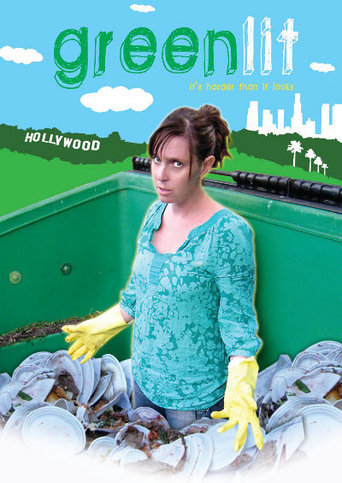Rodney Thompson (RodThompsonJr)
GreenLit turns the camera on the film industry to shed some light on the problems with productions trying to stay as environmentally friendly as possible. Following film producer Miranda Bailey, this documentary visits the set of The River Why, as it attempts to film in an ecologically responsible way. Employing the help of environmental impact consultants, the cast and crew struggle to adhere to the policies set in place in order to be "green." Miranda's willingness to learn and explore the avenues that a production company can utilize to reduce their impact on the environment is noteworthy. However, the overall sense of the crew seems to be that the "green" policies are more inconvenient than helpful.The documentary turns to the waste management companies to get an inside look at the way our garbage is handled once it leaves our homes. Providing varying viewpoints throughout the film, we get a fairly wide representation of peoples' concerns about recycling.Surprisingly, the results of the "green" efforts on set turn out to be rather impressive, as the final data is presented. The film highlights the exuberant and sometimes illogical waste in the industry, while also showing room for everyone to learn more about what they can do to make changes. Overall, the message is clear. We can do better. We just need to start by making the small changes until we come to a point where we practice these habits naturally. GreenLit provides great examples, not only for filmmakers, but everyone to be more responsible with our environment.
luisperozo19
Miranda Bailey presents a straightforward issue with a complex solution - yes, a solution. The film dives straight into the problem and immediately introduces a first step into finding a remedy for the pollution caused by the filmmaking industry. The film delves into the complications of making the film industry 'green.' Without beating around the bush, the filmmaker, Miranda Bailey makes it clear that it is not very simple and easy to 'green-up' the industry, but, also, that giving it a try won't affect the execution and quality of any film production. The pacing of the film is adequate and does its job in conveying a message that is intended leave a mark on the spectator with a very subtle touch.
courtneyhardebeck
Greenlit is an informative and eye-opening documentary. Despite its serious subject matter, the film is fun and entertaining. It points out how easy it is to make small life-style changes that will positively impact the environment, but it also brings attention to how challenging and overwhelming it can be to attempt to implement those changes on a lager scale. It is the first documentary that I have seen that attempts to show how the green movement affects the film industry and vise versa. It definitely made me think about my own recycling habits, and brought to light how much more I can do to help the environment. I would recommend it to a friend.
Annie Hirschmann
The film Greenlit illustrates very well how hard it is to be green on set. I find it very interesting that the film itself is not green, probably because they had a limited budget. Greenlit uses facts, interviews and B-Roll to drive home its main ideas. I thought the documentary did a very good job of showing both sides of the argument. The film also does an outstanding job of showing just how hard and expensive it is to make a smaller budget movie green. The movie follows it's director and star Miranda Bailey through the process of producing an independent feature as well as trying to make it green. Miranda is very likable and I enjoyed watching her go through the process. I could totally relate to her because she was learning as she went along. Miranda is obviously passionate about making the movie industry greener. All in all I learned a lot from this documentary and would recommend it highly to anyone that I know.

